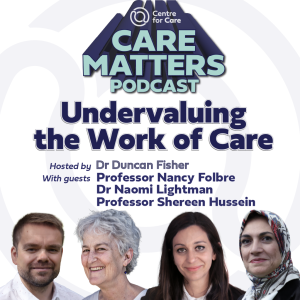An angering dialogue between Professor Nancy Folbre, Dr Naomi Lightman and Professor Shereen Hussein moderated by Dr Duncan Fisher. A production of the ESRC Centre for Care.
This podcast sheds light on the intricate web of challenges surrounding the undervaluation of care work, highlighting experiences from the USA, Canada, and the UK. As we grapple with the expanding care economy in the MENA region, it becomes imperative to reassess how we perceive and value the essential work undertaken by care workers. By amplifying these voices and acknowledging the complexities within the care sector, we can strive towards a future where care is recognized, respected, and appropriately compensated.
Don’t miss the chance to gain deeper insights into this pressing issue by tuning into an engaging podcast that delves into extensive research from the USA, Canada, and the UK. Listen and join the conversation to contribute to the ongoing dialogue about the value of care in our societies.
Listen to the podcast:
In our journey through life, we all encounter moments when we rely on care, yet the intricacies of care work often remain hidden in the shadows. While the care economy and market thrive, the actual care provided is frequently overlooked, leading to a disparity between perceived ease and the undeniable complexity of the work.
The care economy is expanding and positioned as a commodity within the market. However, the inherent value of the care provided is often underestimated, leading to a skewed understanding of the effort and skill required in this vital field.
Care workers, predominantly comprising women and migrants, find themselves in a position of limited bargaining power. Despite their crucial role, the work is unjustly perceived as easy, perpetuating the undervaluation of their contributions.
These issues persist globally, transcending different welfare regimes and country contexts. The struggle for recognition and fair compensation resonates across borders, reflecting a systemic challenge within the care industry.
Both care workers and those relying on care often lack a voice in the larger narrative. This power imbalance further contributes to the challenges faced by those within the care industry, hindering their ability to advocate for fair compensation and improved working conditions.
Founder and Director
Shereen Husseinis a Health and Social Care Policy professor at the London School of Hygiene and Tropical Medicine (LSHTM), United Kingdom.
Shereen Founded the MENARAH Network in 2019, through an initial grant from the Global Challenge Research Fund, UKRI. She is a medical demographer with expertise in ageing, family dynamics, migration and long-term care systems. Shereen regularly collaborates with the United Nations, the World Health Organisation and the World Bank in policy and research focused on ageing in the Middle East and North Africa Region.
Shereen received her undergraduate degree in statistics and a postgraduate degree in computer science at Cairo University. She completed an MSc in medical demography at the London School of Hygiene and a PhD in quantitative demography and population studies at the London School of Economics and Political Science, United Kingdom.






